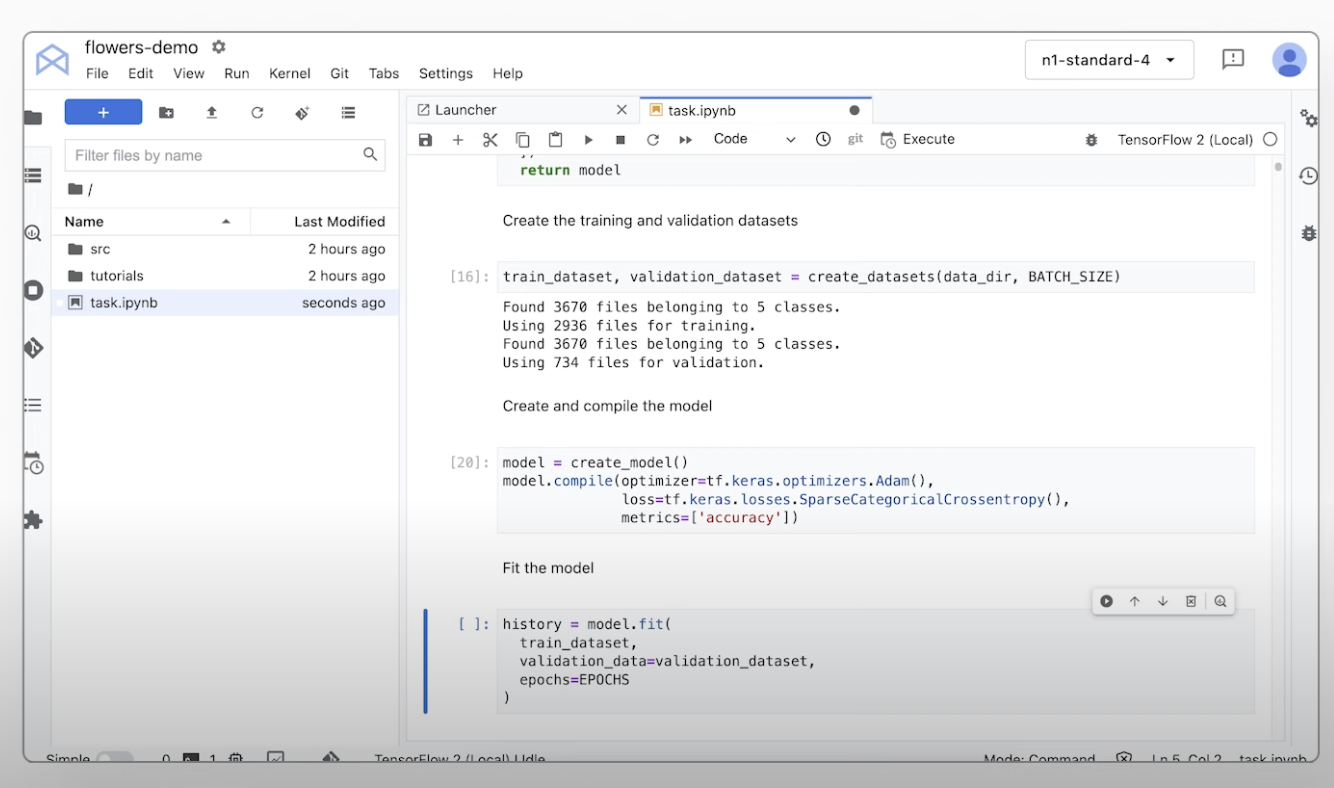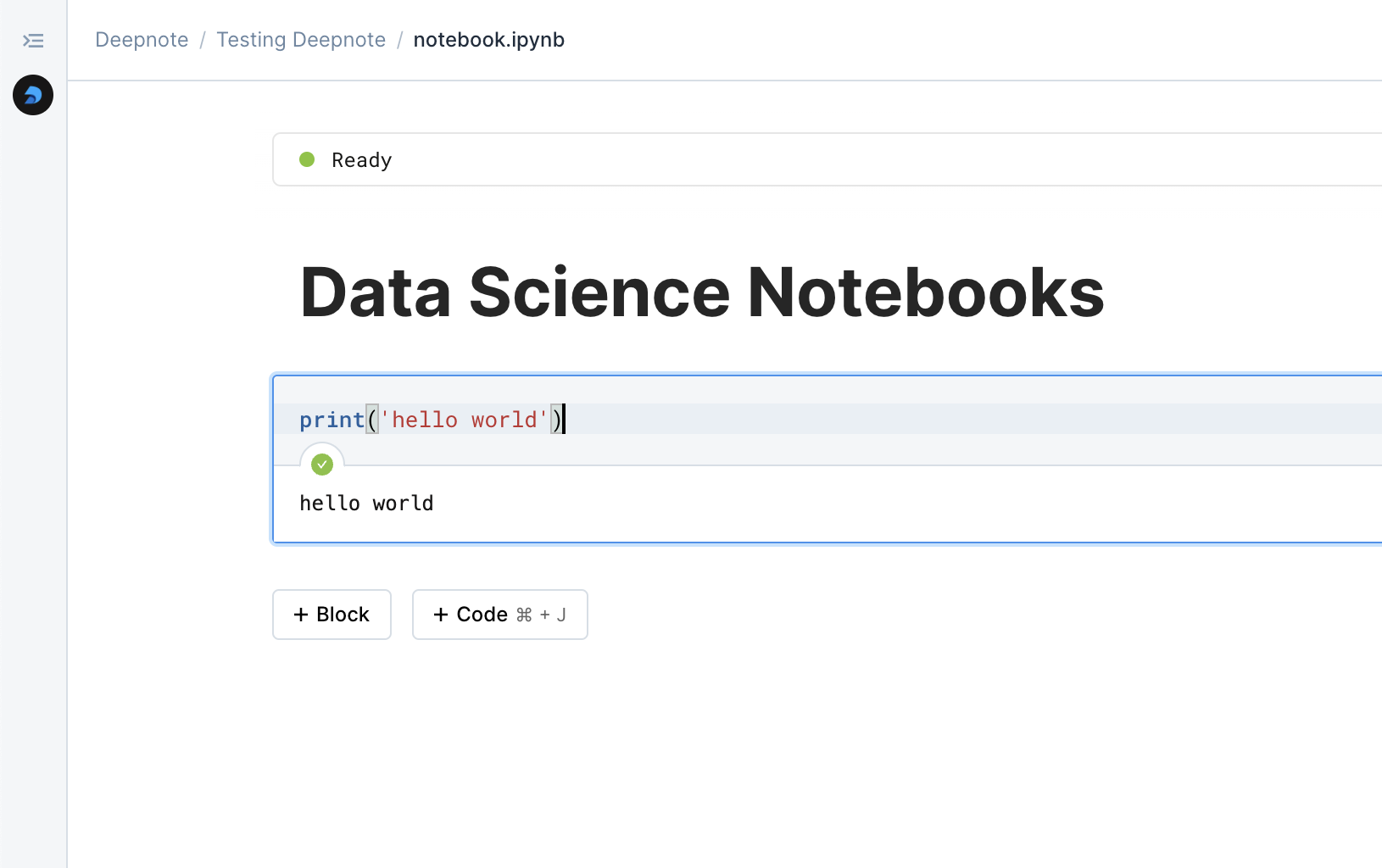

Vertex AI

Comparing two data science notebooks.






In the rapidly evolving landscape of AI and machine learning platforms, Vertex AI and Deepnote represent two distinct approaches to working with AI and data. While both platforms support AI development, they serve different needs in the ML lifecycle and target different user personas. Let's explore their unique approaches and capabilities.
Vertex AI is Google Cloud's unified ML platform designed for the complete machine learning lifecycle. It focuses on productionizing ML models at scale, offering automated machine learning (AutoML) and custom model development capabilities. The platform is built to handle the end-to-end journey of ML models from training to deployment, with emphasis on production-grade ML operations.
Deepnote is a collaborative data science platform that approaches AI development from a research and experimentation perspective. While it supports ML model development, its strength lies in providing an intuitive environment for data scientists to explore, develop, and collaborate on AI projects, with integrated AI assistance for development.
Vertex AI is engineered for enterprise-scale ML operations, emphasizing the industrialization of machine learning. It provides infrastructure for training models on massive datasets, automated ML pipelines, and production deployment capabilities. The platform is designed for organizations looking to implement ML at scale, with features focused on model monitoring, versioning, and serving in production environments.
Deepnote, in contrast, approaches AI development from a research and collaboration perspective. While it supports model development, its strength lies in providing an intelligent workspace for data scientists to experiment, prototype, and collaborate on AI projects. The platform emphasizes immediate productivity and team collaboration, with built-in AI assistance that helps accelerate the development process rather than focusing on production deployment.
Vertex AI represents a production-first approach to AI development. Its AutoML capabilities allow organizations to train high-quality models without extensive ML expertise, while its custom training options support advanced ML engineers in building sophisticated models. The platform includes features like:
Deepnote takes an experimentation-first approach to AI development. Its environment is optimized for rapid prototyping and collaborative development, with features like:
Vertex AI specializes in streamlining the model training process at scale. It provides managed infrastructure for training large models, with features for distributed training and automated hyperparameter tuning. The platform excels at handling the complexities of training production-grade models, including:
Deepnote focuses on the exploratory and development phases of ML projects. Its environment is optimized for iterative development and experimentation, offering:
Vertex AI supports Python for model development and integrates with various Google Cloud services for data processing and ML workflows.
Deepnote supports Python and R, offering advanced code completion and suggestions through Codeium. Deepnote’s integrated development environment (IDE)-like experience with syntax highlighting and code completion makes exploratory coding more efficient and user-friendly.
Vertex AI shines in production deployment scenarios. It provides robust infrastructure for:
Deepnote's strengths lie in the development and prototyping phases rather than production deployment. While models can be developed and tested in Deepnote, production deployment typically involves integration with other platforms or services.
Vertex AI caters to: ML Engineers focused on production deployment, organizations implementing ML at scale, teams requiring automated ML pipelines, or enterprise users needing managed ML infrastructure
Deepnote serves: Data Scientists and Researchers, ML Engineers in the development phase, teams collaborating on AI projects or organizations focusing on AI research and prototyping
Vertex AI, being a part of Google Cloud, integrates seamlessly with Google’s suite of data services, including BigQuery, Cloud Storage, and Dataflow.
Deepnote also excels in data connectivity, offering built-in connectors for major cloud platforms like BigQuery, Snowflake, Redshift, Athena, and Clickhouse. It also integrates with Google Drive, Google Cloud Storage, Amazon S3, Dropbox, OneDrive, and Google Sheets. This extensive range of integrations makes Deepnote highly versatile for various data workflows.
Choose Vertex AI when:
Choose Deepnote when:
Deepnote offers a free tier, a two-week trial with no credit card requirement, and permanent freemium options. Its team and enterprise plans combine seat and usage-based pricing, providing flexibility for various team sizes and usage levels.
Vertex AI follows Google Cloud’s pay-as-you-go pricing model, with detailed pricing information available on the Google Cloud website.
Vertex AI and Deepnote serve different needs in the AI development lifecycle. Vertex AI excels as an enterprise ML platform focused on production deployment and scaling, while Deepnote shines as a collaborative environment for AI research and development.
Organizations often benefit from using both platforms as complementary tools: Deepnote for research, experimentation, and collaborative development, and Vertex AI for production deployment and scaling. The choice between them should be based on where you are in the ML lifecycle and what aspects of AI development you need to optimize.
For teams focused on AI research and collaborative development, Deepnote provides an ideal environment for innovation and experimentation. For organizations ready to deploy and scale ML models in production, Vertex AI offers the necessary infrastructure and tooling for enterprise-grade ML operations.